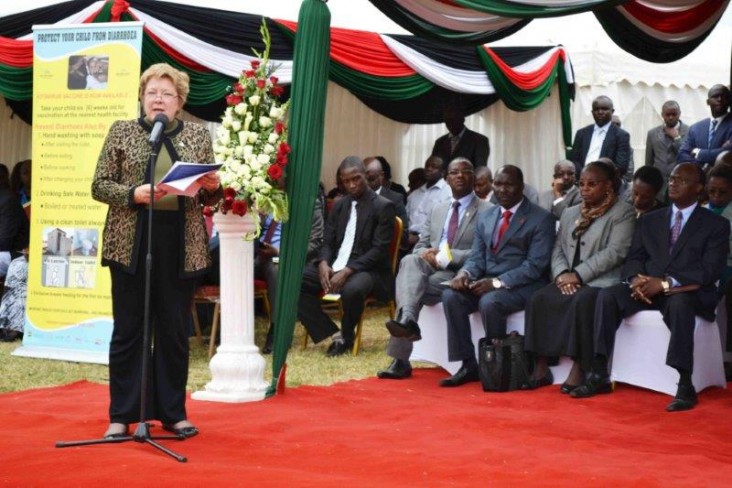
(As prepared)
(All protocols observed)
Thank you for inviting me to be here with you for the national launch of the rotavirus vaccine, the newest addition to Kenya’s immunization schedule.
The U.S. Agency for International Development (USAID) is investing $4 million this year in Kenya’s immunization program. Speaking as a donor, I can tell you that childhood immunization programs provide a very high return on investment. Vaccination services prevent illnesses, which reduce direct health costs and save millions of shillings in indirect costs, a fact I know Secretary Macharia appreciates. More importantly, vaccination services save lives.
The United States and Kenya have been partners for 50 years. Our shared commitment to childhood immunization is a testament to how much we can accomplish when we work together.
The Kenya Expanded Program on Immunization was introduced in 1980 to address the then six common causes of childhood mortality. Over time, the program has grown to incorporate new vaccines that address more causes of childhood mortality. Today, although vaccination services are available for all children, each year approximately 20 percent of infants are not fully immunized. USAID is supporting improvement of data collection to better identify these children and helping in the procurement of vaccines to support outbreak responses.
Our shared commitment to childhood immunization has led to a significant reduction of morbidity and mortality caused by vaccine preventable diseases. The impact of the immunization program can be appreciated by the near elimination of diphtheria and pertussis, which are two diseases that ravaged children before the immunization program was launched in Kenya.
Today, we are witnessing another milestone in Kenya’s vaccination program; the introduction of the rotavirus vaccine, to address another major killer of children, diarrheal diseases. Diarrhoea is a major cause of childhood illnesses and death. The U.S. Centers for Disease Control and Prevention (CDC) in partnership with the Kenya Medical Research Institute (KEMRI) participated in the global studies that showed rotavirus is the leading cause of severe childhood diarrhea. Kenya was also one of the five countries globally where vaccine trials for rotavirus were conducted. The rotavirus vaccine is effective in reducing diarrhoea for those children who access the vaccination service. The introduction of the rotavirus vaccine will complement other proven public health interventions: good sanitation, hygiene and access to safe drinking water.
In preparation for introduction of this vaccine, and with funding from USAID, the CDC and KEMRI have worked together in the past three years to establish platforms for rotavirus and intussusception surveillance to help assess the impact of the vaccine in reducing rotavirus disease and to monitor vaccine safety. USAID has also supported the development of communication materials for this new vaccine.
I challenge all of us to take responsibility to ensure that our children enjoy their childhood by fighting diarrheal disease through vaccination and other interventions. As we introduce new vaccines, help spread the word that all vaccines are equally important and that children need to complete their immunizations according to the national schedule.
USAID remains committed to supporting immunization services in Kenya with both technical and financial assistance. The U.S. Embassy values its partnership with the Government of Kenya and the Ministry of Health and we thank you for everything you do to improve the quality of life for Kenya's children.
Asanteni sana.
Related Speeches
- 6th Mara Day Celebration - Remarks by Brad Arsenault, Deputy Director for East Africa and Operations, Environment Office, USAID Kenya and East Africa
- Signing of a Memorandum of Understanding between Power Africa and the Nile Basin Initiative - Remarks by USAID Kenya and East Africa Deputy Mission Director Dr. Tina Dooley-Jones







Comment
Make a general inquiry or suggest an improvement.